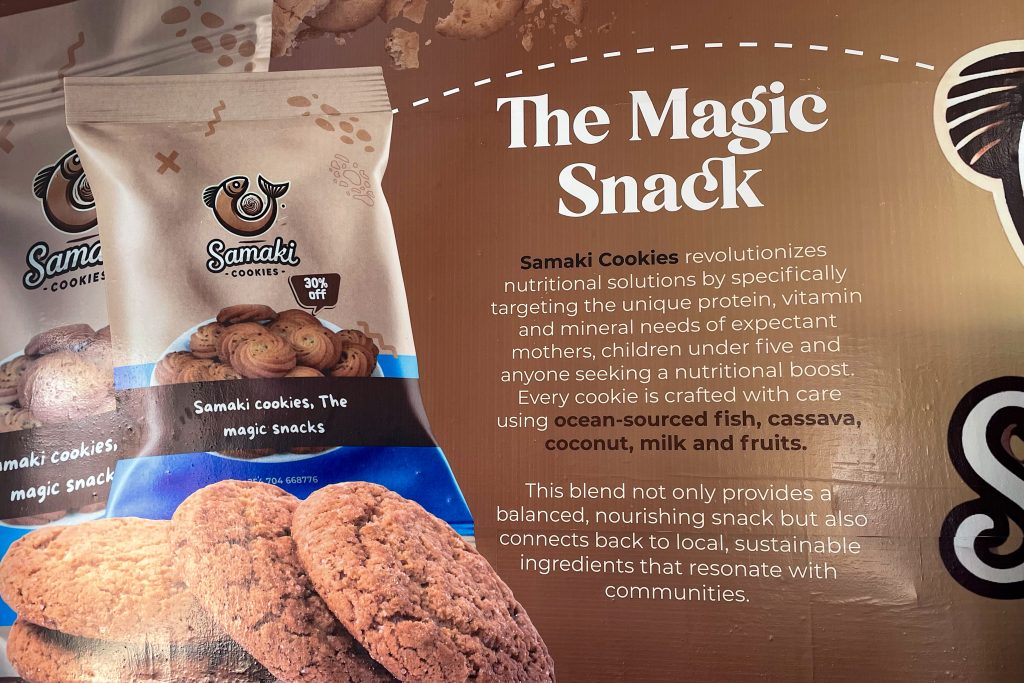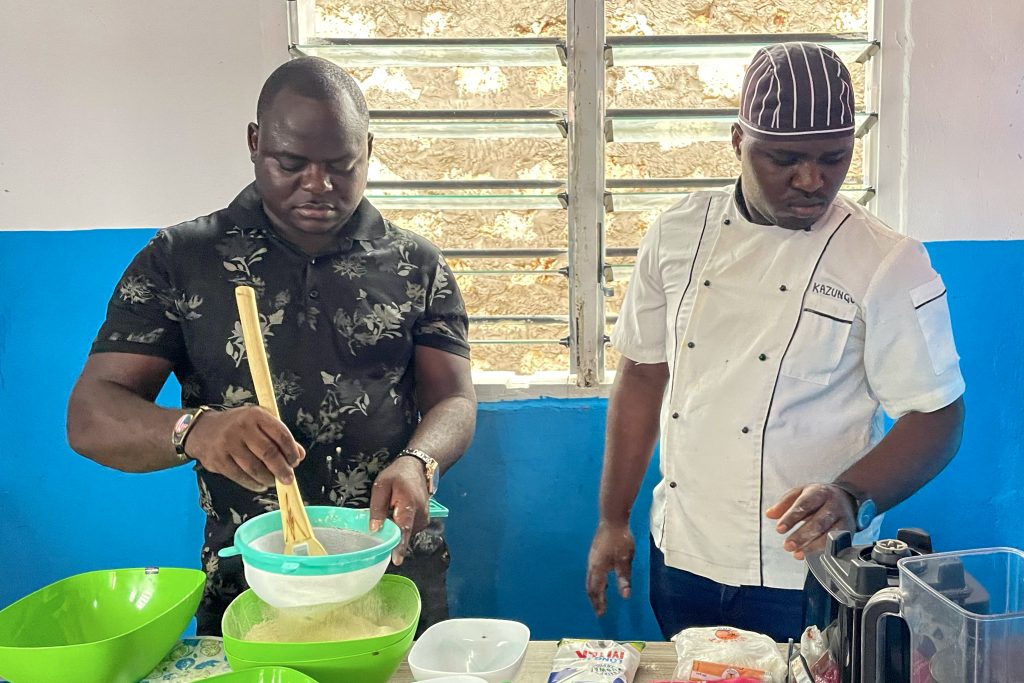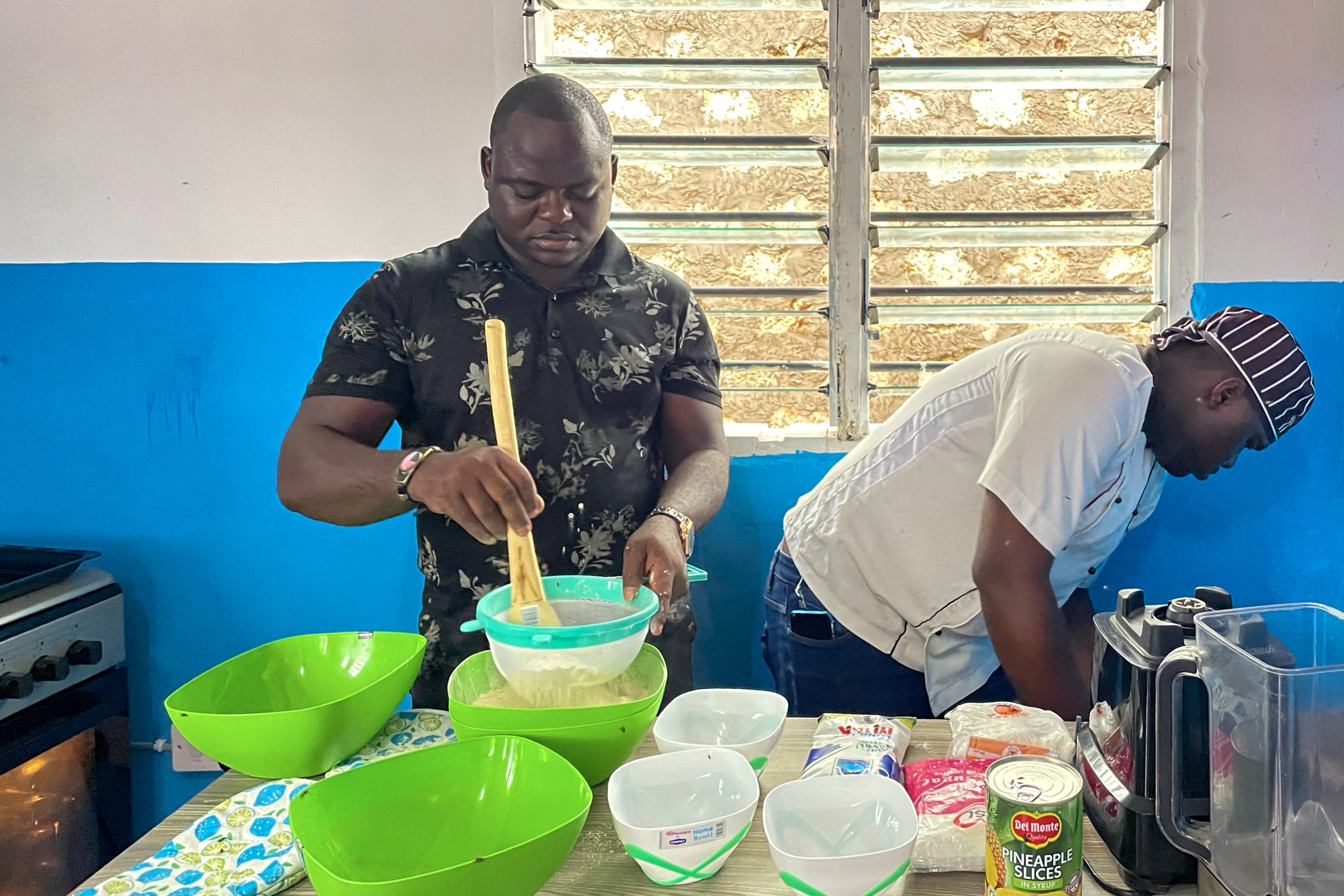When Francis Thoya, the event planner, lost his job and started selling shark meat, things appeared to be going badly for him. But that resulted in a “lightbulb moment” that has since benefited both him and his community.
In a semi-industrial part of Kilifi County on the Kenyan coast, the aroma of baking wafts through the air and spreads down the street. Baking his fish cookies is Francis Thoya’s current task.
“I wanted to create something useful, affordable, and healthy,” Thoya declared as he sat proudly in his modest factory, the focal point of his endeavours to ensure that everyone has access to wholesome foods.
After his entire world was turned upside down by the COVID-19 pandemic, Thoya started working.

Before 2020, Thoya was an event planner specialising in weddings, birthday celebrations, and other events. But with social gatherings outlawed by the statewide lockdown, his once-booming business came to a complete halt.
Thoya began to sell dried shark meat as a way to adapt. Given the lengthy shelf life of shark meat, he believed it was a reasonable move that would enable people to stockpile food during lockdowns.
However, the company soon ran into problems. Due to overfishing, Thoya was forced to shut down the business when the supply of shark meat dried up. There was also the problem of the overpowering smell of the meat.
Some women made a joke about me smelling like a shark while I was making my way home one day. “It was really difficult,” he remarked, laughing.
Then a door opened, though. While searching for a sustainable business idea, Thoya discovered the malnutrition statistics for Kilifi County. The statistics showed that there were severe dietary deficiencies among children under five and pregnant women in the area.
This information was enlightening. Thoya started researching local resources that could be used to fight hunger. He looked into the health benefits of cassava and fruit. Then he recalled his fish encounters and started talking to dietitians and experts. He started experimenting with combining all three elements in a baked dish.
He decided on a cookie solution, which would be acceptable to both adults and children.

Samaki Biscuits, a simple, affordable snack designed to provide the greatest nutrients with the fewest ingredients, were created after months of trial and error.
“These biscuits are rich in protein, omega-3 fatty acids, and other vitamins. Fruits provide you with natural sweetness and vital minerals; fish helps you build your brain; and cassava offers you energy. With every meal, it’s a well-rounded solution,” Thoya stated.
After seeing Thoya’s endeavour, a pastry chef from the area was motivated to join it. Ngumbao Kazungu acknowledged the potential of Samaki Biscuits to save lives and decided to support the cause by contributing his culinary expertise to help develop and refine the creation of these nutrient-dense biscuits.
After being washed, dried, and ground into a fine powder, fresh fish is used. One of Kilifi County’s main crops, cassava flour, is mixed with fish powder.
Fruits such as bananas, pineapples, and mangoes are either pureed or dried and ground into powder to give flavour and nutrition.

Fish, cassava, and fruits are all combined in exact proportions. According to Kazungu, “It’s held together with a little water and butter, and occasionally we add icing sugar for sweetness.”
The dough is then shaped into cookies and fried at a controlled temperature for 45 to an hour. This maintains the nutritional value of the baked product while adding a delightful crunch. After cooling, they are packaged in airtight containers to further maintain their freshness and longevity before being sold over the counter.
Professor Jofrey Kashindi, a researcher in the university’s Research and Extension Division, which organises resources, finds collaborators [like Thoya], and oversees research funds, claims that Pwani University, situated in Kilifi County, tested the biscuits in their lab and discovered that they were a feasible solution to a difficult problem.
“Fruits, fish, and cassava are the three main value chains in this county, and they are all included in this project. To discover any further advantages these cookies might provide beyond what we already understand, we intend to conduct more research,” Kashindi stated.
The introduction of Samaki Biscuits has had further positive effects on the community in addition to improved health. Thoya supports Kilifi’s small-scale farms by buying fruits and cassava from local farmers, thereby fostering sustainable livelihoods.
Local fishermen also have another trustworthy market for their catch, which boosts their earnings and cuts down on wastage.
It is a win-win scenario. Thoya clarified, “We are boosting the local economy in addition to tackling nutritional issues. “
Another Pwani University official, Patricia Mbogo, a food, nutrition, and dietetics instructor with a doctorate in nutrition, feels that action must be taken to prevent malnutrition, particularly in children and pregnant women.
Malnutrition, especially in children and pregnant women, is an issue in Kilifi County. Malnutrition affects about 30% of Kilifi’s under-five population. Mbogo stated, “That’s three or four children out of ten.”
Thoya has been pleasantly surprised by how well his cookies have been received by his target audience. A customer and parent shared how the biscuits had given her hope again, pointing to a lively child laughing with her siblings and saying, “These biscuits have brought back her strength.”
The father is one of a rising number of customers. Thoya sold 10 packets a week at the start of the project, but today she sells 1,000 packs a week.
Despite the obvious success of Samaki Biscuits, Thoya still faces challenges. Funding remains a significant barrier that limits the reach of production and distribution. But Thoya is unwavering in his determination. The gratitude of the families who have benefited from his efforts serves as his source of inspiration.
“I know I’m doing what I’m supposed to do when a mother tells me her child is gaining weight and feeling healthier because of something I made,” he stated.
Thoya has more ambitious plans, although Samaki Biscuits is still a cottage industry for the time being.
He plans to expand distribution beyond Kilifi County, boost manufacturing, and establish partnerships with local medical and educational institutions. His ultimate goal is to help ensure that no mother or kid in Kilifi, and eventually beyond, experiences malnutrition.
He declared, “This is my mission, not just my work.” “I want to show that big issues can be resolved without the use of expensive factories or massive machinery.”
Regarding the children who frequently consume the cookies, their bright eyes and rapid movements as Thoya distributed them convey a tale of a thoughtfully prepared snack. One healthy taste at a time, the biscuits have grown to be a minor but significant part of their everyday routine.
Bird Story Agency


